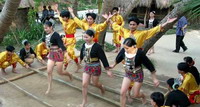| Heritage pact signed |
Scholars from China, Japan and the Republic of Korea, three countries with long cultural links, have signed an agreement on preserving their intangible cultural heritage. They marked China's fourth National Day of Cultural Heritage by attending a forum titled "Experience from the Fields" at the Feng Jicai Research Institute of Literature and Art, Tianjin University. "A nation's intangible cultural heritage represents its people's living national spirit," said Feng Jicai, a famous writer-turned conservationist, who is president of the Chinese Folk Literature and Art Association and Feng Jicai Research Institute of Literature and Art, the two sponsors of the forum. "At a time of globalization, the work of preserving intangible cultural heritage stands for our efforts in holding fast to our cultures and civilizations." More than 20 specialists participated at the forum, whose topics included Yu Weiren's "The Inner Meaning of Surveying the Folk Art Heritage of Guizhou Province", Hoshino Hiroshi's "The Crisis that Japanese Traditional Rural Performing Arts Face" and Park Weonmo's "The Establishment of Digital Documents for the Intangible Cultural Heritage of the Republic of Korea". Hoshino Hiroshi, a lecturer at Japan's Seijo University, said the two countries faced similar problems. "The migration of people from the countryside to the cities is affecting traditional performing arts in both countries' rural areas," he said. "It's important for experts from different countries to to work out better ways to protect our cultural heritage." Oh Sookyung, an expert in Chinese theater and a professor at the Hanyang University in the Republic of Korea, said foreign experts' work could help to better preserve China's cultural heritage. "They can provide their experience and also promote the knowledge of Chinese culture internationally and help to arouse the world's attention," he said. By Mu Qian |
|

